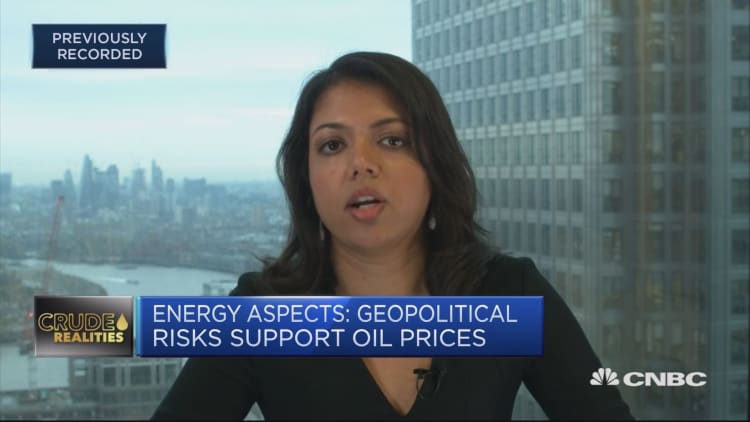
Iran-Saudi Arabia tensions, a potential debt default in Venezuela and a territorial dispute in Iraq — those are just some of the reasons that geopolitics matters to the price of oil right now, according to the chief oil analyst at Energy Aspects.
Speaking to CNBC on Thursday, Amrita Sen said that there were a number of issues that could affect the oil price, with a particular concern being the lack of "inventory buffer" — a cushion of oil supply — if production was to fall from major oil producers for economic or political reasons.
"Even if there is a flare up in Iran (with Saudi Arabia) we don't see exports and production being lost, but Iraq is probably a bigger issue right now with the dispute between Baghdad and Kurdistan, we have lost a decent chunk (of output), about 300,000 barrels per day of volume from the north (of the country). In Venezuela too, production is absolutely plummeting," she said.
"And the reason that of all these become far more important is that there is no oil inventory buffer anymore. OPEC spare capacity is a lot lower and that's why geopolitics matters. If you think about the last three years, we've hardly had any geopolitical premium in the price but now, because we don't have a buffer, geopolitics will matter a lot more which can lead to spikey-ness in oil prices next year."
Sen's comments come amid an improving outlook for oil prices following the sharp declines seen since 2014 due to a glut in supply and lackluster demand. Brent crude was trading at $61.58 per barrel on Thursday and West Texas Intermediate at $55.18. Prices have been helped by major oil producers OPEC and non-OPEC producers, including Russia, agreeing to limit oil output in a bid to support prices.
Sen said that $60 to $65 per barrel range for oil was the "new range for Brent."
"The move up to $60 was very much a fundamentally driven move. We have seen phenomenal demand right through the last two years, and particularly this year, and supplies have been falling thanks to OPEC, but also non-OPEC supplies haven't risen by as much as people thought.
"Since then, however, we have seen a flare-up of geopolitics, Saudi Arabia and Iran relations have deteriorated and, as a result of that, we have seen a significant uptick in prices and that's the correction you're seeing now. Some of those geopolitical issues haven't gone away, but they're not in the limelight.
"You're going to see a volatile range between $60 and $65 but this is the new range for Brent as opposed to the $50 to $55 range that we had even just a few months ago."
Sen spoke come ahead of a meeting of OPEC oil producers at the end of November where the expectation is that oil output cuts will be extended beyond the current expiry date of March 2018.
"The market is becoming a little more skeptical about that because Russia has raised concerns that, at $60 to $65 a barrel, shale oil is going to grow a lot more strongly so there are some reports that the decision could be delayed to February or March when the deal expires."
Energy Aspects believed that there would be a decision at OPEC's November 30 meeting, however, because markets were expecting such a move and, Sen said, "the stakes are too high."
"The market is expecting it and if they don't do anything prices could fall sharply," she said.


